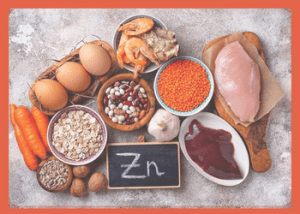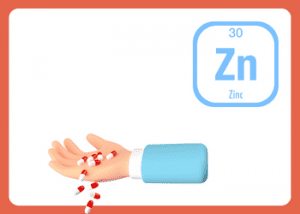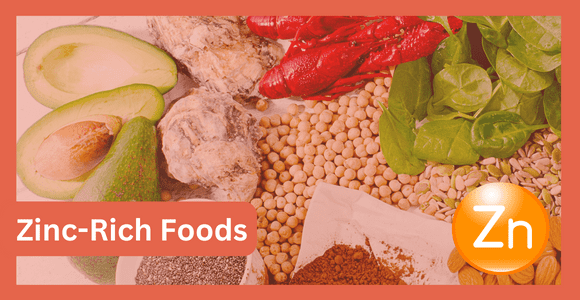Zinc is a pivotal mineral that is part of more than 300 enzymes in the body and is required for numerous vital processes including wound healing, immune system functioning, protein and DNA production, adult fertility, children’s growth as well as preserving olfactory senses.
An inadequate intake of zinc can result in stunted development and cause diarrhea, impotence, hair loss, eye/skin lesions reduced appetite, or weakened immunity.
Unfortunately, taking in too much zinc supplement can cause a variety of unpleasant effects such as nausea, vomiting, lack of appetite, abdominal cramps, diarrhea, and headaches. In addition to this, it may prevent the correct absorption of copper and iron if it’s done for an extended period of time.
Table of Contents
What Foods are Highest in Zinc?
Zinc is an essential mineral that your body needs for a variety of bodily functions, from healing wounds to helping keep your immune system strong.
Additionally, it’s instrumental in many enzymatic reactions and found in several proteins such as enzymes and transcription factors. Without zinc, these processes would be unable to occur efficiently!
 A lack of zinc can have serious consequences, including stunted growth and weakened immune systems. To ensure proper cell development and function, adults should consume 8-11 mg of zinc daily.
A lack of zinc can have serious consequences, including stunted growth and weakened immune systems. To ensure proper cell development and function, adults should consume 8-11 mg of zinc daily.
There are many foods that are rich in zinc. The following are some of the best sources of dietary zinc:
- Oysters – If you’re looking to up your dietary zinc consumption, look no further than oysters! Just 6 medium-sized ones can give you a whopping 32mg of the nutrient.
- Beef – Beef offers a rich source of Zn, delivering an impressive 4.5-5.5 mg of dietary zinc per 3 ounces when cooked—an incredible contribution to your daily nutritional needs
- Pork – Pork is also a good source of dietary zinc, with a three-ounce serving of cooked pork providing approximately 2.9 mg.
- Chicken – Adding chicken to your diet is an excellent way of ensuring that you get enough zinc. A mere 3-ounce portion of cooked, boneless, and skinless chicken breast supplies 1 mg or more of this essential mineral.
- Shellfish – Not just oysters, but other seafood like crab and lobster offer great dietary sources of zinc too! A single 3-ounce serving of this type of shellfish can provide you with 1.5-3.4 mgs worth of zinc-so get your essential nutrient fix while savoring some delicious eats
- Legumes – Legumes including chickpeas, lentils, and kidney beans are excellent sources of Zn in your diet. A single-cup serving provides between 1.3-2.9 mg of dietary zinc
- Nuts and seeds – For an important zinc boost, one-ounce servings of pumpkin seeds, cashews, and almonds are excellent dietary sources – each offering 0.6-1.6 milligrams of this essential mineral.
- Dairy – Dairy products, such as yogurt and cheese, are superb sources of dietary zinc. A single cup of plain yogurt contains a generous 1.7 mg portion whereas one ounce of cheddar cheese can provide 0.9mg worth
It’s imperative to acknowledge that the amount of zinc your body is able to absorb can differ depending on where it comes from.
Animal sources, like oysters and beef, offer significantly higher absorption rates compared to plant-based options such as legumes and nuts. The bioavailability of zinc from plant-based foods can be amplified by soaking, sprouting, and fermenting.
Additionally, keep in mind that certain components may impede the uptake of zinc such as phytates which are found in grains and legumes; they bind to it thus stopping its absorption into the body.
Eating a range of foods that are high in zinc can help you reach your daily recommended intake and ensure adequate nutrition.
Zinc-Rich Fruits and Vegetables
Which Fruit is Rich in Zinc?
| Fruits | Serving Size | Zinc Content |
|---|---|---|
| Avocado | 1 cup, sliced | 0.6 mg |
| Pomegranate | 1 medium fruit | 0.3 mg |
| Raspberries | 1 cup | 0.3 mg |
| Blackberries | 1 cup | 0.2 mg |
| Guava | 1 medium fruit | 0.2 mg |
| Kiwi | 1 medium fruit | 0.2 mg |
| Apricot | 1 medium fruit | 0.2 mg |
What Vegetable is High in Zinc?
| Vegetables | Serving Size | Zinc Content |
|---|---|---|
| Spinach | 1 cup, cooked | 1.4 mg |
| Mushrooms (shiitake) | 1 cup, cooked | 1.4 mg |
| Peas | 1 cup, cooked | 1.2 mg |
| Lima Beans | 1 cup, cooked | 1.2 mg |
| Asparagus | 1 cup, cooked | 0.4 mg |
| Brussels Sprouts | 1 cup, cooked | 0.4 mg |
| Kale | 1 cup, cooked | 0.3 mg |
It’s important to note that these tables only include a selection of fruits and vegetables that are good sources of zinc. There are also other plant-based foods that contain zinc, such as nuts, seeds, and whole grains.
Foods High in Zinc and Low in Copper
Consuming foods high in zinc and low in copper on a consistent basis is not recommended, as copper has an irreplaceable role within the body.
Zinc and copper need to be balanced for optimal effectiveness; consuming too much zinc without complementing it with adequate amounts of copper can potentially lead to deficiency. However, here is a list of foods that are relatively high in zinc and lower in copper:
- Beef
- Lamb
- Chicken
- Turkey
- Oysters
- Crab
- Lobster
- Shrimp
- Pumpkin seeds
- Cashews
- Quinoa
It’s critical to remember that these foods are rich in zinc but still contain small amounts of copper. For optimal health, it is suggested to eat a variety of zinc-rich meals and consult a healthcare provider before making any major nutritional changes or taking supplements.
How Much Zinc Should You Take to See Benefits?
The amount of zinc needed to see benefits varies depending on the individual’s age, gender, health status, and other factors. The daily recommended intake of zinc for adults is 8-11 mg per day for women and 11-14 mg per day for men. Pregnant and lactating women have higher zinc requirements, with recommended daily intakes of 11-13 mg and 12-14 mg, respectively.
 However, some individuals may require higher amounts of zinc for certain health conditions or situations.
However, some individuals may require higher amounts of zinc for certain health conditions or situations.
For example, individuals with zinc deficiencies or malabsorption issues may require higher doses of zinc supplements under medical supervision.
Additionally, athletes or individuals with high levels of physical activity may require additional zinc to support muscle growth and recovery.
It’s important to note that excessive intake of zinc can be harmful and may cause adverse effects, such as gastrointestinal issues, reduced immune function, and copper deficiency. The tolerable upper intake level (UL) of zinc for adults is 40 mg per day.
Therefore, it’s important to consult with a healthcare professional to determine the appropriate dose of zinc for an individual’s specific needs and to avoid exceeding the UL of zinc intake.
Additionally, obtaining zinc from a varied and balanced diet is generally recommended over relying solely on supplements to meet daily zinc requirements.
Zinc is a crucial mineral that supports numerous bodily processes, such as boosting the immune system, helping with protein production, and aiding in wound recovery.
Zn is also known to offer several benefits for the skin. Here are some specific benefits:
- Wound Healing: Zn is a key nutrient that facilitates wound healing and skin repair. Not only does it boost cell growth, but its anti-inflammatory properties also reduce inflammation and redness in the epidermis.
- Acne Treatment: Zn has been proven to be a powerful and effective tool in the treatment of acne. Its antimicrobial properties help reduce bacterial growth that brings about pimples, while its anti-inflammatory benefits diminish redness and inflammation often associated with this condition. So you can trust zinc to assist you in your battle against acne!
- Sun Protection: Zn oxide is widely used in sunscreen as it forms an impenetrable physical barrier on the skin, which reflects and scatters UV radiation. As a result, users can feel confident that their skin will be well-protected from sunburns and other damage caused by extended exposure to sunlight.
- Skin Barrier Function: Zn plays an integral role in maintaining the skin’s barrier function, safeguarding it from outside stressors including UV radiation and pollution while also restricting water loss.
- Wound Healing in Skin Disorders: It has been demonstrated to reduce inflammation, enhance skin barrier function, and substantially improve wound healing in people struggling with eczema or psoriasis. Studies show that zinc accelerates the healing of lesions in persons suffering from these debilitating conditions.
To conclude, Zn can be incredibly beneficial for your skin health and provide several advantages including the healing of wounds, treating acne, shielding it from sun exposure, maintaining a healthy barrier layer, and relieving symptoms related to certain skin disorders such as eczema or psoriasis. Nonetheless, don’t forget that you must supplement these topical applications with sufficient nutritional intake in order to ensure the comprehensive well-being of your complexion.
Frequently Asked Questions
Are Eggs High in Zinc?
Eggs are an excellent source of zinc and can help you reach your daily recommended amount. One large egg provides up to 6.6% of the daily value for women, and 4.8% for men – making it easy to incorporate into your diet.
Can I Take Zinc and Vitamin D Together?
Taking zinc and vitamin D together is generally safe and can be beneficial, as both nutrients play crucial roles in maintaining overall health. Here’s a detailed exploration of their synergistic effects, optimal timing, and potential interactions.
Roles of Zinc and Vitamin D
Zinc: This essential mineral supports immune function, wound healing, DNA synthesis, and cell division. Zinc is also vital for proper taste and smell.
Vitamin D: This fat-soluble vitamin regulates calcium and phosphorus absorption, promoting bone health. It also modulates immune function and reduces inflammation.
Can You Take Them Together?
Yes, you can take zinc and vitamin D together. They do not compete for absorption and can complement each other’s roles in the body. For example, vitamin D enhances immune function, which is also supported by zinc. Together, they can offer a synergistic boost to your immune system.
Optimal Timing for Absorption
Zinc: Zinc supplements are best taken on an empty stomach to maximize absorption. However, they can sometimes cause stomach upset, so if this occurs, take zinc with a small meal. Avoid taking zinc with high-fiber foods or supplements, as fiber can inhibit zinc absorption.
Vitamin D: Vitamin D is best absorbed with a meal containing fat, as it is a fat-soluble vitamin. Taking vitamin D with your largest meal of the day, which typically contains the most fat, can enhance its absorption.
Combined Intake Strategy
To optimize the absorption of both nutrients, consider the following strategies:
- Morning: Take your zinc supplement on an empty stomach or with a small meal, avoiding high-fiber foods.
- Midday or Evening: Take your vitamin D supplement with your largest meal of the day, ensuring it contains some healthy fats.
Potential Interactions and Considerations
- Calcium and Magnesium: While zinc and vitamin D do not interfere with each other, taking high doses of calcium or magnesium with zinc can reduce zinc absorption. If you are taking these minerals, space them out by a few hours.
- Copper Balance: Long-term zinc supplementation can interfere with copper absorption, leading to a deficiency. If you are taking zinc for an extended period, consider a supplement that includes copper or discuss with your healthcare provider.
Consistency and Dosage
- Dosage: Follow recommended dosages based on your specific health needs and dietary intake. The typical recommended daily allowance (RDA) for zinc is 8-11 mg for adults, while for vitamin D, it is 600-800 IU, though higher doses may be recommended for certain individuals.
- Consistency: For optimal benefits, take your supplements consistently at the same times each day.
Conclusion
Zinc is naturally present in many delectable recipes, including beef and pork, chicken, and seafood like oysters, crab, or lobster. If you’re looking for an especially concentrated source of zinc, however – look no further than a single serving of succulent oysters which boast more than your daily recommended intake! Don’t forget about plant-based sources either such as whole grains, nuts & legumes to round out your diet with this essential nutrient.
Plant-based foods such as beans, lentils, chickpeas, whole grains, nuts, and seeds are excellent sources of zinc. Even though plant-derived sources may contain lower concentrations of zinc than animal products do; they still play an important role in meeting daily nutritional requirements.
It is worth mentioning that several elements can hinder the body’s capacity to take in zinc from food sources. For instance, phytates present in grains and legumes have been known to bind to zinc, consequently decreasing its absorbability. On the contrary, consuming foods enriched with zinc together with a source of vitamin C can enhance absorption significantly.
In summary, indulging in meals loaded with this essential mineral aids one in keeping adequate levels of it within their bodies that will contribute towards better bodily health and vitality as a whole. To maximize intake & absorption – hence benefitting most from these goodies – be sure your diet consists of an assortment of them.
